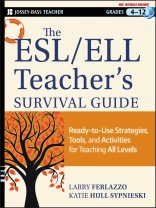A much-needed resource for teaching English to all learners
The number of English language learners in U.S. schools is projected to grow to twenty-five percent by 2025. Most teachers have English learners in their classrooms, from kindergarten through college. The ESL/ELL Teacher s Survival Guide offers educators practical strategies for setting up an ESL-friendly classroom, motivating and interacting with students, communicating with parents of English learners, and navigating the challenges inherent in teaching ESL students.
* Provides research-based instructional techniques which have proven effective with English learners at all proficiency levels
* Offers thematic units complete with reproducible forms and worksheets, sample lesson plans, and sample student assignments
* The book s ESL lessons connect to core standards and technology applications
This hands-on resource will give all teachers at all levels the information they need to be effective ESL instructors.
Table des matières
About the Authors v
Acknowledgments xi
Introduction xiii
Bonus Web Content xiv
PART ONE: GETTING STARTED WITH ENGLISH LANGUAGE LEARNERS 1
1. ESL Instruction: The Big Picture 3
Some Facts About the ELL Population 5
A Primer on ESL Research 7
A Quick Tour of ESL Best Practices 10
2. ESL Classroom Basics: Building a Positive and Effective Learning Environment 13
The First R: Building Relationships 14
The Second R: Resources in the ESL Classroom 26
The Third R: Establishing Routines 32
PART TWO: TEACHING BEGINNING ENGLISH LANGUAGE LEARNERS 37
3. Key Elements of a Curriculum for Beginning ELLs 39
Key Elements of a Curriculum
4. Daily Instruction for Beginning ELLs 71
Reflection 71
Homework 74
Field Trips 82
Assessment 83
Picture Word Inductive Model Unit Plan 85
A Sample Week in a Two-Period Beginning ESL Class 88
Year-Long Schedule 92
Other Activities 113
PART THREE: TEACHING INTERMEDIATE ENGLISH LANGUAGE LEARNERS 121
5. Key Elements of a Curriculum for Intermediate ELLs 123
Key Elements of a Curriculum 124
6. Daily Instruction for Intermediate ELLs 149
Reflection 149
Homework 150
Field Trips 150
Assessment 153
A Sample Unit: Problem-Solution 153
A Sample Week in a Two-Period Intermediate ESL Class 180
Inductive Lesson Plan 184
Using Text to Generate Analytical Writing Lesson Plan 191
Other Activities 198
PART FOUR: TEACHING ENGLISH LANGUAGE LEARNERS IN THE CONTENT AREAS 203
7. English Language Learners in the Mainstream Classroom 205
What Is the Organizing Cycle? 206
8. Teaching Social Studies 215
Building Relationships with Students 215
9. Teaching Science 223
One Size Does Not Fit All 223
Building Relationships with Students and Accessing Prior Knowledge 224
Identifying and Mentoring Students’ Leadership Potential 225
Learning by Doing 227
Reflection 227
An Important Final Note 228
10. Teaching Math 229
Making Math Relevant 229
Building Relationships with Students and Accessing Prior Knowledge 230
Identifying and Mentoring Students’ Leadership Potential and Learning by Doing 232
Reflection 235
PART FIVE: FURTHER STRATEGIES TO ENSURE SUCCESS 237
11. Using Learning Games in the ESL Classroom 239
Research Support 240
What Are the Qualities of a Good Learning Game? 240
12. Handling Potential Challenges 249
Student Motivation 250
The Advantages of Being Bilingual or Multilingual Lesson Plan 251
The Qualities of a Successful Language Learner Lesson Plan 257
Textbook Integration 264
Error Correction 265
Limited Access to Educational Technology 266
Multilevel Classes 267
Primary Language Use in the ESL Classroom 270
Classroom Management 271
Book Selection 272
13. Assessing English Language Learners 275
Assessing ELLs: Key Principles 276
Afterword 291
Notes 293
Index 313
A propos de l’auteur
Larry Ferlazzo is the author of ‘Larry Ferlazzo’s Websites of the Day’ (http://larryferlazzo.edublogs.org), the popular blog for teachers of English Language Learners and one of the most popular education blogs for all teachers. He teaches English at Luther Burbank High School in Sacramento, California.
Katie Hull Sypnieski teaches English at Luther Burbank High School in Sacramento, California, serves as a teaching consultant with the Area 3 Writing Project at University of California, Davis, and is a lead trainer for the WRITE Institute (Writing Reform Institute for Teaching Excellence).












